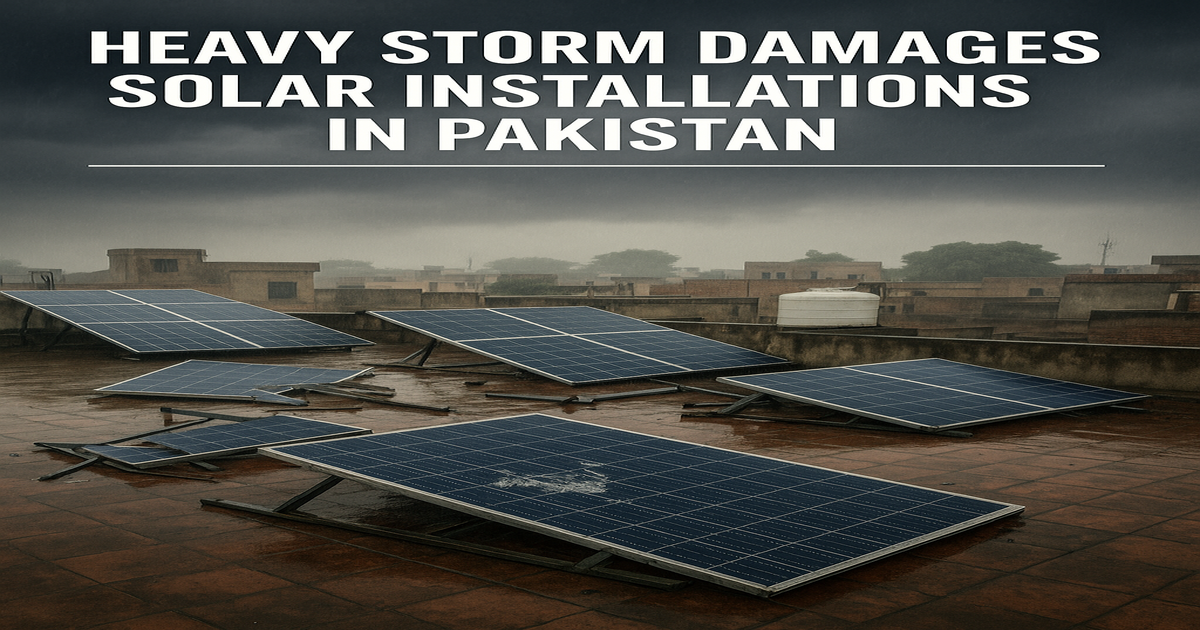
Heavy Storm Damages Solar Installations in Pakistan
- May 27, 2025
- 0
Over the last few days, a strong and unseasonable storm system hit a number of major Pakistani cities, such as Lahore, Faisalabad, and Multan—with powerful winds, heavy rain, and extensive property damage. Solar panel installations were perhaps among the hardest hit, with many knocked off their mounting, shattered, or simply destroyed from poor mounting, low-quality equipment, or without any weather-proofing.
As Pakistan advances quickly toward the adoption of solar power, this event has been a wake-up call for solar firms, house owners, and policymakers alike.
What Happened: A Storm That Exposed Weaknesses
The storm, which occurred on May 23, delivered wind speeds over 80 km/h in certain places. Rooftop solar panels—particularly ones mounted atop dwellings—suffered the most. Inadequately attached frames, faulty brackets, and incorrect tilt angles sent dozens of panels flying off rooftops or shattering under pressure.
Resident locals reported losing complete arrays in the space of minutes, and several installations inflicted collateral damage on parked vehicles, water tanks, and adjacent properties.
Why Did Solar Panels Fail So Widely?
Although solar panels themselves are made to last through extreme conditions, installation quality is usually the culprit. The main factors leading to the storm-related failures are:
• Employment of low-cost, non-weather-sealed mounting kits
• Failure to conduct structural audits prior to installations
• Inadequate tilt and wind-load design
• No inspection or maintenance following installations
Most consumers, willing to cut down electricity expenses, choose the lowest-cost providers without checking experience or certification—resulting in corners cut that are only highlighted in worst-case scenarios such as during this storm.
How the Industry Needs to React
This accident highlights the necessity for more standardized guidelines and quality-control protocols within Pakistan's solar industry. Measures that should be a priority include:
• Forced certification of solar installers and technicians
• Compliance with structural inspections prior to panel installation
• Sturdier mounting structures for local wind forces
• Regular inspection by qualified technicians
For homeowners, this is a lesson in diligence prior to solar panel installation. It's important to deal with reputable firms that won't cut corners at the expense of safety.
Increased Solar Adoption: Risk and Opportunity
Despite this temporary setback, solar energy remains one of the most promising solutions for Pakistan’s energy crisis. In cities like Lahore, solar adoption is growing rapidly—not just among homeowners, but also among businesses looking to reduce operating costs.
If you're considering venturing into the solar sector, this event holds valuable lessons in quality, safety, and reliability. To those considering starting a business venture in this field, one must grasp the entire landscape—customer expectations and licensing to technical training.
Read our comprehensive Guide to Start a Solar Panel Business in Lahore to find out how to establish a reliable and future-proofed business in Pakistan's rapidly growing solar industry.
Looking Ahead: Creating a Resilient Solar Future
Pakistan is well familiar with weather extremes. If the solar industry is to succeed, it needs to develop—not only in terms of size but in resilience. The recent storm has proven that taking shortcuts during installation can result in huge financial losses, lowered public confidence, and even safety risks.
By prioritizing quality, safety, and long-term support, solar providers can capitalize on this crisis as a chance to build stronger—and wiser.
Related:
Follow our blog for news, industry insights, and information that informs your energy choices.
Did solar damage occur to your home or business during the storm? Let us know in the comments.




